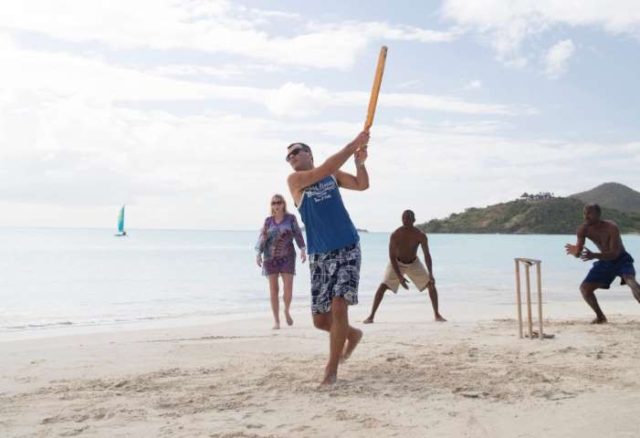
Originally brought to their idyllic shores by the British, the people of Antigua & Barbuda have taken to the game of Cricket as fiercely as vacationers have taken to the islands’ warm climate, blue waters, and breathtaking beaches. Much like the destination itself – a dazzling duality of the more metropolitan Antigua and the unspoilt Barbuda – its national sport can now claim a sibling of its own: Twenty20 cricket is the new kid on the block changing everything spectators think they know about bowlers, batters, and wickets.
That’s all well and good but…well, what is Twenty20 cricket? If you’re a layman like us, fear not: read on for a breakdown and an engaging look at where the sport has been (and may go in the future) in Antigua & Barbuda.
Twenty20 Cricket in Twenty Sentences or Less
Twenty20 Cricket is a (relatively) new variant of the beloved game that has been taking the cricketing world by storm. Initially conceived in 2003, the Twenty20 ruleset aims at making cricket more accessible to a wider audience by adopting a slew of spectator-friendly rule tweaks. While cricket purists may turn their noses up at this fast and fun variant, there’s no question that it’s been successful: Twenty20 tournaments are now a mainstay on the international competitive scene, with the West Indies taking a particular shine to the game – they’ve won the sport’s biggest international tournament twice!
So, what exactly is different about Twenty20? In a nutshell:
- The game puts a hard limit on the “overs” (think: pitching attempts) allotted to each team. Additionally, each side has a limit of 80 minutes to get through their 20 overs. In concert, this means a Twenty20 game will always wrap up within a day of play – a far cry from the weeks traditional cricket can sometimes take!
- Twenty20 mandates that teams must play with fewer fielders, increasing the number of runs (and thus, excitement) in the average match. Teams are restricted to only 2 fielders outside the powerplay (a section on the field).
- The umpire is empowered to hand out penalties to teams they perceive to be playing exceptionally slowly. Additionally, many of the transition periods between the action have tight timers to preserve the pace and flow of the match.
While this certainly isn’t an exhaustive list of the changes, the gist is clear: this is a streamlined form of cricket optimized for speed of play and spectator excitement. In pursuit of both of these goals, it’s fair to say that Twenty20 has been wildly successful!
Old Meets New in the West Indies
That Twenty20 has rapidly gained such a foothold in Antigua & Barbuda may be surprising to some for one very simple reason: the traditional game has transcended into the realm of being a religion on the island. At any given time, one can likely find a game of pick-up cricket being played somewhere on the island, and nothing is known to bring the people of Antigua & Barbuda together more than watching a professional match at the Antigua Recreation Ground. Despite the island’s small size and limited population, Antiguans have made an outsized splash on the professional scene: historic players like Andy Roberts and Richie Richardson have carved out a permanent place in the annals of the game’s history, while cricket legend Sir Viv Richards ranks amongst the greatest batters of all time. Hey, he even has a knighthood to prove it!
It is perhaps a testament to both the openmindedness of the Antiguan people and their sheer love of the sport that Twenty20 has been embraced on the island so readily. Twenty20 and traditional cricket now coexist side by side, with professional teams (and plenty of public support) for both variants. Where some might see the new format as sacrilege, the Antiguans seem to view it as an intriguing reimagination of their beloved traditions. Of course, the fact that the West Indies team has won more than their fair share of Twenty20 tournaments probably has something to do with it!





